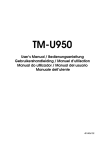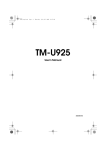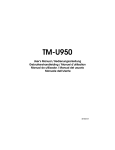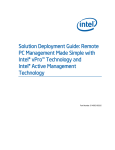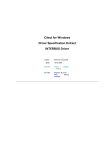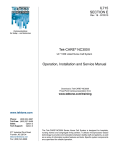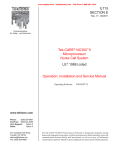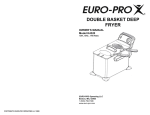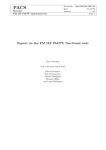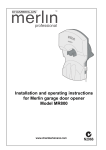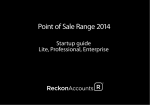Download Certificate
Transcript
(1918, 2017, 2162, 2176, 2286, 2437, 2536, 2616, 2619, 2650) III(5)a Certificate Pursuant to section 12 of the Weights and Measures Act 1985 Series V001 Revision 1 Certification No Valid until Certification No Valid until 1918/67 Revision 2 26 September 2015 2437/35 Revision 2 13 January 2014 2017/69 Revision 2 4 September 2016 2536/51 Revision 2 26 October 2016 2162/60 Revision 2 2 September 2011 2616/02 Revision 2 13 January 2014 2176/72 Revision 2 23 March 2014 2619/35 Revision 2 23 March 2014 2286/47 Revision 2 13 January 2014 2650/26 Revision 2 30 December 2012 Authorisation is hereby given by the Secretary of State for Business, Innovation & Skills for the following Certificates of approval relating to a pattern of a liquid flowmeter to be modified as described below. As described in the Certificates below but modified to have an alternative self service device, as detailed in the descriptive annex, and having the following characteristics:DISPENSER(s): Dispensers described in certification numbers: 1918, 2017, 2162, 2176, 2286, 2437, 2536, 2616, 2619 and 2650. SELF SERVICE DEVICE: Passport Europe’ combined kiosk control and point of sale system as described in the descriptive annex. UNATTENDED PAYMENT TERMINAL SPOT M3 as described in the descriptive annex Submitted by: Gilbarco Veeder-Root Ltd Crompton Close Basildon Essex SS14 3BA United Kingdom Signatory: for Reference No: T1118/0026 Date: 29 June 2011 P R Dixon Chief Executive National Measurement Office Department for Business, Innovation & Skills Stanton Avenue Teddington Middlesex, TW11 0JZ United Kingdom CONTENTS 1 INTRODUCTION 2 CONSTRUCTION 3 OPERATION 4 INTERLOCKS AND SECURITY FEATURES 5 AUTHORISED ALTERNATIVES 6 RECOMMENDED TESTS 7 CERTIFICATE HISTORY ILLUSTRATIONS Figure 1 Figure 2 Figure 3 Figure 4 Figure 5 Figure 6 Figure 7 Figure 8 Figure 9 Figure 10 Figure 11 Figure 12 Figure 13 Figure 14 Figure 15 Figure 16 Figure 17 Figure 18 Figure 19 Figure 20 Figure 21 Figure 22 Figure 23 Figure 24 System Schematic Diagram Multi POS system with Back Office Computer Passport Europe Computer Passport Europe PC External Connection Ports (later version shown in lower image) Display / Touchscreen Data Distribution Module Customer Display Receipt Printer Multifunction Printer Passport Europe Sales Screen PDDM DDM DDM/PDDM PCB Assembly Primary Junction Box Primary Junction Box PCB Typical IFSF interconnections Typical Unmanned interconnections Industrial ruggedised hub Hub mounted in data interface box SPOT M2 OPT SPOT M3‘OPT Pay’ SPOT OPT Side Mounted SPOT ‘Flexpay’ SPOT outside payment terminal packaging 2 Descriptive Annex 1 INTRODUCTION Having the dispenser described in the Certification connected to the Gilbarco Veeder-Root ‘Passport Europe’ combined kiosk control unit and point of sale terminal. The Passport Europe is a combined kiosk control unit and point of sale system with a serial link to a Data Distribution Module (DDM) that communicates to the dispensers via a current loop interface. Alternatively the system may have an interface capability to operate via an IFSF site control protocol. The system is a PC based unit incorporating an LCD screen with an integral touchscreen. All Server Point of Sale (POS) mains powered components are supplied via an uninterruptible power supply (UPS). A schematic diagram of a typical system is shown in Figure 1. Multiple POS systems may be connected, and this may include a Back Office unit as shown in Figure 2. If required, each POS may be powered via a UPS, but it is only a requirement for the Server POS to be powered via a UPS. A typical workstation consists of: Passport Europe Computer Housing Display / Touchscreen Magnetic Card Reader Customer Display Cash Drawer Receipt Printer Uninterruptible Power Supply Data Distribution Module Additional equipment Bar code reader Multifunction printer Report printer Mouse Keypad 3 2 CONSTRUCTION 2.1 Passport Europe Computer (Figure 3 and 4) This is the main CPU and support architecture that is PC based. It is housed in a metal industrial case, which includes a protective cover over the connection ports and an integrated uninterruptible power supply unit (UPS). Alternatively the housing may have: - additional ventilation louvers additional ventilation louvers in the front. It contains the following major components: 2.1.1 Logitron PSPH Internal Power Supply (P/N 50592) - This power supply provides DC power for the internal logic boards and some of the attached peripherals. It also provides power for approximately 90 seconds in the event of mains power failure to allow the PC to power down correctly. 2.1.1.1 alternative. The power supply ‘PSPE’ with diagnostic LED indicator may be used as an 2.1.2 ASUS Motherboard (Model No: TX97.XE) - A Pentium motherboard containing processor, memory and peripheral components. 2.1.2.1 The Soltek SL-65LIV-T motherboard may be used as an alternative. 2.1.2.2 The Pentium 4 MB800 Industrial motherboard may be used as an alternative. 2.1.2.3 The Intel Desktop DQ965GF motherboard may be used as an alternative. 2.1.2.4 The motherboard with part number MS6368 may be used as an alternative. 2.1.3 CD/DVD ROM - A standard PC CD or DVD ROM drive or writer. 2.1.4 Network Board (LAN) - The computer may contain an Ethernet card for connecting other terminals. 2.1.5 CORE Board - This is a special to type interface card that is used to interface to the receipt printer, the barcode reader, the customer display and the dispenser interface (Data Distribution Module). This card would normally only reside in the Server POS computer. 2.1.6 Modem Board - The computer may contain a modem card to allow remote diagnostics, credit card authorisation and EFT. 2.1.7 monitor. Video Board - The computer contains a video card for interfacing to the 4 2.1.8 Hard Drives The Server computer has 2 hard drives. One is a master and contains the main database master copy; the other is a slave and contains the working copy of all data. Alternatively the hard drives may be configured for RAID operation (mirrored) A Client POS computer may only have one hard drive. Hard Drives - The Server computer has 2 hard drives. One is a master and contains the main database master copy; the other is a slave and contains the working copy of all data. Alternatively the hard drives may be configured for RAID operation (mirrored) A Client POS computer may only have one hard drive. 2.1.9 Floppy Drive - This is a standard 3.5” floppy disk drive. 2.1.10 Tape backup - The computer may contain a Tape Drive for use when backing up data contained on the hard drives. 2.2 Operator Display (Figure 5) This is manufactured by PREH and designated Touch Commander, Model No: MC 12 T3R4W60 bc. It is an LCD flat colour monitor with touch screen interface. This provides the operator with forecourt status information, transaction data for each fuel dispenser, and gives a visual display of all the operator commands and instructions and displays retail transaction data. It is connected to the VGA port and a serial port at the Passport Europe computer. 2.3 Data Distribution Module (Figure 6) The Data Distribution Module (Model No: BW706028-02) is manufactured by Gilbarco. It converts the serial data from the Passport Europe computer into a current loop signal for communication to the fuel dispensers. It is connected to an RS 422 serial port at the Passport Europe computer. 2.4 Customer Display (Figure 7) This customer display (Model No: ICD-2002F-B) is manufactured by Puritron Technology Inc. It is a 40 character two line Vacuum Florescent display and displays the dispenser number, the price to pay and the sequence number for each fuel transaction selected. It is connected to an RS 485 serial port at the Passport Europe computer. 2.5 Receipt Printer (Figure 8) The receipt printer is manufactured by Epson and is designated TM88. It is connected to an RS 232 serial port at the Passport Europe computer. Alternatively any appropriately CE marked receipt printer may be connected. 2.6 Multifunction Printer (Figure 9) This printer is capable of printing receipts, cheques and credit card slips. The printer is manufactured by Epson and is designated TM-U950 Model No M62UA and is connected to an RS 232 serial port at the Passport Europe computer. Alternatively any appropriately CE marked Multifunction printer may be connected. 5 2.7 ISDN Interface This is a Cisco 761 and is connected to the serial Com port at the Passport Europe computer. Alternatively any appropriately CE marked ISDN Interface may be connected. 2.8 Cash Drawer This may be any cash drawer with a solenoid release. It is connected to a to an RS 232 serial port at the Passport Europe computer. 2.9 Bar Code Reader This is a Metrologic 6720 and is connected to an RS 232 serial port at the Passport Europe computer. Alternatively any appropriately CE approved barcode reader may be used. 2.10 Magnetic Card Reader Any CE approved Magnetic Card Reader may be used. This optionally may be integrated into the lower Display housing. It is connected to an RS 232 serial port at the Passport Europe computer. 2.11 Uninterruptible Power Supply (UPS) Any CE approved UPS that will supply the Primary POS system for a minimum period of 15 minutes. 2.12 IFSF site control protocol Connection may be made to any suitably configured equipment including fuel dispensers, payment terminals, forecourt equipment (such as tank gauges) and to ancillary equipment (such as carwash). 2.12.1 Data Distribution Module and Power and Data Distribution Module The PDDM (Power and Data and Distribution Module) is shown in Figure 11 and the DDM (Data Distribution Module) is shown in Figure 12. Each consists of a metal box which houses power supply unit and an interface card. Model No:BT606981 (Figure 13). The boxes may vary in size depending on the size and configuration of the forecourt. The interface card provides IFSF connection from each pump to a LON RJ45 connector at the Passport Europe computer. The PDDM has an identical IFSF interface, but contains an additional section for power distribution. 2.12.2 IFSF Primary Junction Box The IFSF Primary Junction Box is shown in Figure 14 and consists of a metal box which houses power supply unit and an interface card. Model No: G1031 (Figure 15). The box may vary in size depending on the size and configuration of the forecourt. The interface card provides IFSF connection from each pump to a LON RJ45 connector at the Passport Europe computer. 6 2.12.3 System Figure 16 shows a typical example of the system interconnection when Passport is connected to IFSF pumps using the DDM. 2.12.4 Software Issue The software version number is 42.36.61.12 and can be displayed by pressing ‘Shift/Day End’ button and then the ‘About’ button 3 OPERATION 3.1 Dispenser Monitoring (Figure 10) The dispenser status is displayed on the pump control icons in the top section of the front office display. A change in status is reflected in the icon display. A change in status of a dispenser (e.g. when it is authorised) is shown on every POS. Details of typical Pump Icons are shown below: - Free Pump Pump Calling Pump in use Pump stopped by the operator Pump with one Pump with outstanding transaction pre-paid credit Pump with two 3.2 outstanding Transactions 7 Dispenser Call When a nozzle is removed from a dispenser, the pump control icon will change to the ‘Pump Calling’ icon as shown above. To authorise the dispenser the appropriate pump icon is touched and a new window appears. The Authorise box is then touched to authorise the pump. When the nozzle is returned to the dispenser the pump icon will change to either ‘Pump with one outstanding transaction’ or ‘pump with two outstanding transactions’ as appropriate. 3.3 Stopping the dispensers To stop a single pump the appropriate pump icon is touched and a new window appears. The Stop box is then touched to Stop the dispenser. To restart the Resume box is touched. To stop all of the pumps at the same time, the ‘Stop all’ box on the main screen is touched. 3.4 Normal Sales Operation Sales operations are identical on each POS. 3.4.1 Follow on transactions When a nozzle is returned to the dispenser the pump icon will change to ‘Pump with one outstanding transaction’ as shown above. If the nozzle is removed for a second purchase then the dispenser may be authorised for the next transaction. Following completion of the transaction, and providing there is a stored transaction (i.e.: two outstanding transactions), the dispenser will not be able to be authorised until either the current or the stored transactions are paid off and cleared. 3.4.2 Clearing for payment Following a completed delivery the appropriate pump icon is touched. This will open a new window, which displays any outstanding transactions for that pump. If two sales are present on the selected dispenser then both amounts will be shown. Pressing the appropriate button will initiate a sales transaction, and the amount to pay and any other required data will be shown on the customer display unit. The fuel transaction can be selected at any point of a sales transaction, and it will be added to that transaction. Fuel sales can also be deleted from the current transaction and sent back to the pump window for payment at a later time. Another pump fuel sale can be selected if required. Once the transaction details are correct the transaction can be paid off by selecting the appropriate payment method and a receipt printed if required. It is also possible to have multiple fuel sales on the same transaction and receipt, before the method of payment is selected. Dry stock items can be added by either selecting them from the appropriate button on the display, or by swiping them using the barcode reader. 8 3.5 Method of Payment When the customer requests to pay by cash and presents the exact money, the operator touches the CASH button on the display and a receipt can be printed if required. If the purchaser presents a higher amount than that required, the operator keys in the amount on the numeric touchpad on the screen. When the customer requests to pay by CARD, the operator touches the CARD button on the display. Other methods of payment, such as cheque, Local account, manual card voucher, can be registered by touching one of the payment keys on the display. The transaction is completed and a receipt can be printed if required. 3.6 Pre Payment Pre payment may be made in the kiosk by cash, cheque, or credit for the amount of fuel required. Either the POS will print a prepay receipt, or a hand written prepay receipt will be given to the customer. Fuelling may now begin at the dispenser, which has been pre-paid. The dispenser will then stop at the cash limit after delivering fuel. On replacing the nozzle if the customer has taken less fuel than he has paid for, a refund may be obtained at the kiosk. A full receipt may be printed or hand written at the Point of Sale. 4 INTERLOCKS AND SECURITY FEATURES 4.1 UPS In the event of any type of mains power failure, the UPS will maintain the Server POS for at least 15 minutes. 4.2 Duplicate Receipts Any duplicate receipts are clearly marked with COPY…COPY…COPY… 4.3 Operating System Security The POS is PC based and runs on the Windows NT Version 4.0 operating system. The only way to gain access to the operating system is via a password-protected mode of operation, which is reserved for use by an Engineer. 4.4 Software version The approved Metrological application software version number is 34.61.20.42 and can be displayed by touching the ‘About’ button on the front office display. This version relates to all pump control functions and all other metrological functions that are the subject of this certificate. 4.4.1 Alternative revised software. Metrological software version number for the revised software is 32.22.52.66. 4.4.2 Alternative revised software. Metrological software version number for the 9 revised software is 69.94.62.73. 4.4.3 Alternative revised software. Metrological software version number for the revised software is 32.64.91.59. 4.4.4 Alternative revised software. Metrological software version number for the revised software is 30.51.80.31. 4.4.5 Alternative revised software. Updated pump driver software so that the price held in Passport Europe is automatically sent to the dispenser when the dispenser is switched from stand-alone mode to self-service mode. The functionality described in the certificate remains the same. The new software version number is 53.92.20.79. 4.4.6 Alternative revised software. The pump driver software has been updated; the functionality described in the certificate remains the same. The new software version number is 51.30.40.16. 4.4.7 Alternative revised software to support the SPOT M3 CRIND. Metrological software version number for the revised software is 22.71.85.03. 4.4.8 Alternative revised software to support the SPOT M3 OPT. Metrological software version number for the revised software is 25.92.14.86. 4.4.9 Alternative revised software to support the authorised alternatives introduced in Revision 1. Metrological software version number for the revised software is 31.29.01.53 5 AUTHORISED ALTERNATIVES 5.1 Receipt/Multifunction Printer Any non-intelligent simple recipient printer that bears the CE mark for conformity to the EMC Directive 89/336/EEC may be connected. It shall not be capable of transmitting any data or instructions into the instrument, other than to release the printout or to check for correct data transmission. 5.2 Management printer Any CE marked printer may be connected to a workstation for non-trade and management purposes. 5.2 Modem A BABT approved and CE marked modem may be connected, using serial communications, to a serial port on the Passport Europe Computer. 5.3 Operator Display Any CE marked LCD flatscreen or CRT monitor may be used. The layout and functionality is the same as described. Where the screen does not have a ‘Touch’ interface a mouse must be used for making selections on the screen. 10 5.4 Tank Level Gauge Any CE marked tank level gauge detection system may be connected, using serial communications, to a serial port on the Passport Europe Computer. 5.5 Price sign A Pole Sign fuel price display may be connected, using serial communications, to a serial port on the Passport Europe Computer. 5.6 Car Wash A Car Wash controller may be connected, using serial communications, to a serial port on the Passport Europe Computer. 5.7 LPG Any CE marked LPG Dispenser may be connected, via the Data Distribution Module. 5.8 Payment Terminal Any CE Marked Indoor Payment Terminal may be connected, using serial communications, to a serial port on the Passport Europe Computer. 5.8 Loyalty Card Terminal Any CE Marked Loyalty Card Terminal may be connected, using serial communications, to a serial port on the Passport Europe Computer. 5.9 Alternative Name The system may be named ‘PUMA- PRO’ rather than ‘Passport Europe’ 5.10 SPOT OPT (Outdoor Payment Terminal) 5.10.1 Terminal Construction The Secure Payment Outdoor Terminal (SPOT) has two basic component architectures. M2 (Figure 20) In this arrangement, the display and pinpad are combined as one physical unit M3 (Figure 21) The M3 SPOT terminal is a development of the M2 SPOT terminal, the major change being separation of the secure pin pad from the display. These are now two physically separate units connected via secure encrypted communication channel. The payment terminal accepts bank and fuel cards. The payment terminal has alternatives described below and is dependent upon a separate forecourt control system for all sequencing and transaction data. 11 As an alternative to mounting the SPOT into the dispenser (CRIND), it can be mounted independently on a pedestal to controller customer selected pump. (Figure 22) The major components used in the SPOT OPT configuration are the same as used for the SPOT M3 CRIND configuration. The SPOT OPT operates as the CRIND, but with the added functionality which allows the customer to select which fuelling point the transaction is to be made from. (Figure 23) The SPOT can be packaged in a number of different pumps (CRIND) or in a number of different pedestal configurations (OPT) as shown in figure 24. The SPOT communication is via TCP/IP using Ethernet CAT5 communication. The communication is from the Passport network port through a ruggedised Ethernet hub, Figure 18, which is mounted in the CRIND/OPT distribution module, Figure 19. This hub provides network isolation between forecourt Ethernet network and the kiosk (POS) Ethernet network. 5.10.1.1 RFID interface An optional I/O device with RF transponder for use with TAG devices of the Radio Frequency Identification Device (RFID) type. This is typically the Texas Instruments key fob device. Where installed, the SPOT-CRIND/OPT collects the TAG number and passes it to the host POS using the same software and hardware systems used for cards. 5.10.1.2 Contact less cards An optional card interface that communicates to contact less chip cards. Where installed, the SPOT-CRIND/OPT collects the card information and processes it in an identical manner to that used in the contact card interface. 5.10.1.3 Journal log All transactions and system events are recorded in the journal file, one file for each day. A total of 1 year (365 files) is stored after which the oldest is overwritten. The files are copied to a second partition as additional backup, and the data integrity is further ensured by storage on a mirrored RAID array. These journals can be accessed remotely. The journal is not editable and can be viewed only by site manager using his management login credentials. There is no site access to the journal outside the Passport application. 5.10.1.4 Journal printer Having any CE approved printer connected to the Passport Europe as an additional transaction storage device. 5.10.1.5 Receipt printer Any receipt printer that bears the CE mark for conformity to the EMC Directive may be used. 12 5.10.2 Interlocks and Security Features 5.10.2.1 Paper insufficient to print receipt The SPOT CRIND/OPT terminal printer detects when the printer paper is low and displays a message warning the customer that a receipt is not available but allows further transactions to commence. Alternatively, the system can be configured to prevent any new CRIND/OPT transactions starting once paper low has been detected. The SPOT CRIND/OPT can be configured to print receipts automatically or on demand 5.10.2.2 Printer fault If the terminal identifies a printer fault, a message states that the receipt is unavailable but gives the customer the choice to proceed with transaction. 5.10.2.3 Power Loss In the event of a power failure in unmanned configuration, the transaction details are memorised and completed when the power is restored. 5.10.2.4 Duplicate receipts Duplicate receipts are not available. A receipt can be printed only once. 5.10.3 Printed information The following information is printed. Receipt: Address of the station Receipt number Date and Time Transaction volume, price to pay and pump number 13 5.10.4 Operation INSERTS CARD REMOVE NOZZLE IF APPLICABLE MILEAGE & REGISTRATION REQUESTED CHOOSE ANOTHER METHOD OF PAYMENT SYSTEM CHECKS CARD & SENDS FOR OLA PROCESS AS PAY IN SHOP TRANSACTION IF APPLICABLE PIN ENTERED CARD OK OR DECLINED DECLINED OK RECEIPT REQUIRED? BEGIN FUELLING MAX £XXXX IF RECEIPT PAPER OUT, “RECEIPT UNAVAILABLE” MESSAGE DISPLAYED FOR OPT OPERATION, PROMPT TO SELECT PUMP STOP PUMP REPLACE NOZZLE IN PUMP TRANSACTION COMPLETE REMOVE NOZZLE NO RECEIPT REQUESTED ? YES FOR OPT OPERATION, PROMPT TO SELECT PUMP PRESET LIMIT BEEN REACHED OR CUSTOMER REPLACED NOZZLE PRINT RECEIPT NO CONTINUE FUELLING TRANSACTION COMPLETE YES 14 5.11 ALTENATIVE POS PC TOSHIBA ST-A10 As described in the certificate but having the alternative POS PC designated TEC ST A-10 manufactured by Toshiba. The PC may have any peripheral equipment connected identified in the certificate. 5.12 PASSPORT SOFTWARE ON RUGGADISED SERVER UTILISING DOMS PSS 5000 SITE CONTROLLER 5.12.1 Introduction The PASSPORT system is as described in the certificate but the Passport Europe Computer assembly is replaced with a Ruggadised PC, Intercomp model CNPEUROPE_10_01 and the DOMS PSS 5000 site controller. 5.12.2 Forecourt controller DOMS The DOMS PSS 5000 forecourt controller comprises a metal rectangular box housing the following main components. • • • 5.12.3 A power supply A Central Processing Board (CPU) with 8 serial ports (CPB508): this has an LCD 16x2 character alphanumerical display and a keyboard comprising 5 keys for navigating the menu options. Hardware interface modules: dispensers are connected to the CPU board via an appropriate hardware interface module compatible with the communication protocol of the dispenser. DOMS Software The DOMS PSS 5000 has a legal authority module (LAM) for the UK containing specific parameter values and functions. Reference to the PSS 5000 software version number is not normally required, but may be accessed as follows: typical LAM version number is 498-06100 and 0D6C for the checksum number. These can be viewed by selecting the appropriate menu heading using the operator keys on the CPU. The LAM version number and checksum are accessed as follows: When the PSS is powered on, the first line displays the application software version and the current time. The second line displays the W&M Service menu. Pressing the Down Arrow once, displays the W & M menu, which comprises 7 sub-menus, W.1 to W.7. Press the right button once to obtain W.1 – LAM INFO and press again to display Version and Checksum information. 5.13 CONNECTION TO WEIGHING INSTRUMENT Any non-automatic weighing instrument issued with an EC type-approval certificate by a Notified Body for type approval under Directive 2009/23/EC in any Member State may be connected to the server/POS PC. The software controlling the operation of the weighing instrument is described in EC Test Certificate GB-1398. 15 5.14 ALTERNATIVE EPSON POS PCS IR300/IR310/IR320/IR700/MR800 As described in the certificate but having the alternative POS PC designated IR300, or IR310 or IR320 or IR700 or MR800 manufactured by Epson. The PC may have any peripheral equipment connected identified in the certificate. 6 RECOMMENDED TESTS The following tests may be carried out in addition to those specified in the Regulations to determine conformity to the approved pattern. 6.1 Software Verification Check that the correct metrological software version number, as detailed in section 4.4, is installed on each Passport Europe Computer. This can be displayed by touching the ‘About’ button on the computer display. 6.2 System Features 6.2.1 progress. Check that unit price changes at the dispenser are inhibited when sales are in 6.2.2 Check that the memorised transactions are correct and that it is not possible to release the dispenser to a third purchaser. 6.2.3 Check that when mains power is removed from the system, the Server Point of Sale is operational for a minimum of 15 minutes to allow unpaid transactions to be paid off. 6.3 Prepay Check that when the prepay method of operation is used that: (i) The Fuel Dispensers are fitted with 2 stage pre-set solenoid valves (ii) The Fuel Dispenser stops at exactly the PREPAY cash value. (iii) A notice is displayed advising purchasers using the prepay facility to take a prepay receipt for the amount prepaid. (iv) The volume pre-set function is disabled. 16 7 CERTIFICATE HISTORY ISSUE NO. DATE DESCRIPTION Certification No 1918/67 Certification No 2017/69 Certification No 2162/60 Certification No 2176/72 Certification No 2286/47 Certification No 2437/35 Certification No 2536/51 Certification No 2616/02 Certification No 2619/35 Certification No 2650/26 14th January 2004 24th March 2004 6th October 2000 24th March 2004 14th January 2004 14th January 2004 24th March 2004 14th January 2004 24th March 2004 31st December 2002 Type examination certificate first issued. Type examination certificate first issued. Type examination certificate first issued. Type examination certificate first issued. Type examination certificate first issued. Type examination certificate first issued. Type examination certificate first issued. Type examination certificate first issued. Type examination certificate first issued. Type examination certificate first issued. Revision 1 of above certificates 8th May 2009 - Amendments and variants consolidated into one document Series (V001). - 2.1.3 added DVD ROM drive or writer - 2.1.8, option of RAID mirrored drives - 2.3, UK part number for distribution box (instead of US one) - 2.5 Added option of any CE marked receipt printer - Alternative software version numbers in sections 4.4.3, 4.4.4 and 4.4.5 - Fig 4 Updated serial channel I/F picture to current production - 5.10 Addition of SPOT M3 OPT V001 Revision 2 29 June 2011 Revision 1 issued: Addition of the following sections 4.4.9 Alternative Software version 5.10.1.5 Receipt printer 5.11 Alternative PS PC Toshiba ST-A10 5.12 Passport software on ruggadised server utilising DOMS PSS 5000 site controller 5.13 Connection to weighing instrument 5.14 Alternative Epson POS PCs IR300/IR310/IR320/IR700/MR800 17 Figure 1 System Schematic Diagram 18 Figure 2 Multi POS system with Back Office Computer 19 Figure 3 Passport Europe Computer 20 Figure 4 Passport Europe PC External Connection Ports (later version shown in lower image) 21 Figure 5 Display / Touchscreen Figure 6 Data Distribution Module 22 Figure 7 Customer Display Figure 8 Receipt Printer Figure 9 Multifunction Printer 23 Figure 10 Passport Europe Sales Screen 24 Figure 11 PDDM Figure 13 Figure 14 Figure 12 DDM DDM/PDDM PCB Assembly Primary Junction Box Figure 15 25 Primary Junction Box PCB Figure 16 Typical IFSF interconnections 26 Figure 17 Typical Unmanned interconnections 27 Figure 18 Figure 19 Industrial ruggedised hub Hub mounted in data interface box 28 Figure 20 Figure 22 SPOT M2 OPT Figure 21 SPOT OPT Side Mounted SPOT M3‘OPT Pay’ Figure 23 29 SPOT ‘Flexpay’ SPOT-CRIND fitted to an Enterprise Pump (M2 or M3) SPOT-CRIND fitted to an Encore 510 Pump (M2 or M3) SPOT-CRIND fitted to a SK700 Pump (M2 or M3) SPOT-CRIND fitted to a Encore 500G Pump (M3) SPOT-CRIND fitted to a Euroline Pump(M2 or M3) Figure 24 SPOT outside payment terminal packaging © Crown copyright 2011. This material may be freely reproduced except for sale 30






























